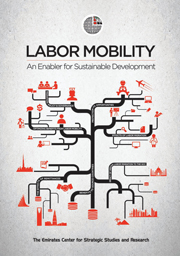Book contents
- Frontmatter
- Contents
- Figures and Tables
- Abbreviations and Acronyms
- Foreword
- Introduction
- 1 The Development Impacts of Temporary Migration and the Protection vs. Opportunities Trade-off
- 2 The Economic Development Benefits of Human Mobility to Source Countries
- 3 The Effects of Remittances
- 4 Recessions and Remittances in Home and Host Countries: An Overview
- 5 Seize the Spotlight: A Case for GCC Engagement in Research on the Effects of Labor Migration
- 6 Migration Policy and Governance in the GCC: A Regional Perspective
- 7 Optimizing benefits from Labor Mobility: The Case for Research Collaboration between Bangladesh and the GCC
- 8 Drivers of Development: The Impact of Indian Labor Migration to the GCC
- Contributors
- Notes
- Bibliography
- Index
6 - Migration Policy and Governance in the GCC: A Regional Perspective
Published online by Cambridge University Press: 05 September 2014
- Frontmatter
- Contents
- Figures and Tables
- Abbreviations and Acronyms
- Foreword
- Introduction
- 1 The Development Impacts of Temporary Migration and the Protection vs. Opportunities Trade-off
- 2 The Economic Development Benefits of Human Mobility to Source Countries
- 3 The Effects of Remittances
- 4 Recessions and Remittances in Home and Host Countries: An Overview
- 5 Seize the Spotlight: A Case for GCC Engagement in Research on the Effects of Labor Migration
- 6 Migration Policy and Governance in the GCC: A Regional Perspective
- 7 Optimizing benefits from Labor Mobility: The Case for Research Collaboration between Bangladesh and the GCC
- 8 Drivers of Development: The Impact of Indian Labor Migration to the GCC
- Contributors
- Notes
- Bibliography
- Index
Summary
In recent years, platforms for contributing to the international dialogue on migration have multiplied at the regional and inter-regional levels. These efforts underlie the now common understanding that migration is a transnational phenomenon which impacts countries of origin, transit, and destination, and that balancing divergent national interests along with the needs and rights of migrants themselves is essential for ensuring beneficial development outcomes for all. Embedded in a common understanding that migration and development are inexorably linked, and underscoring the need for the economic, social, and human rights of migrants to be safeguarded, regional consultative platforms allow for improved dialogue and cooperation amongst nations that face similar challenges around migration. In addition to enhancing the exchange of experiences and improving policy coordination, such efforts also play an important role by diffusing regional perspectives into the broader, global migration agenda.
This paper is intended to contribute to the ongoing debate on regional cooperation and policy harmonization on labor migration to the Gulf Cooperation Council (GCC) countries. The first section of this paper briefly reviews the general trends in migration to the region, highlighting the fact that the GCC demonstrates the highest density of migrants to nationals seen anywhere in the world. In the second and third sections the primary structural features of regional labor migration are discussed, in particular the impact of kafala arrangements and the transnational labor brokerage system that brings workers to the Gulf.
- Type
- Chapter
- Information
- Labor MobilityAn Enabler for Sustainable Development, pp. 121 - 142Publisher: Emirates Center for Strategic Studies and ResearchPrint publication year: 2013



